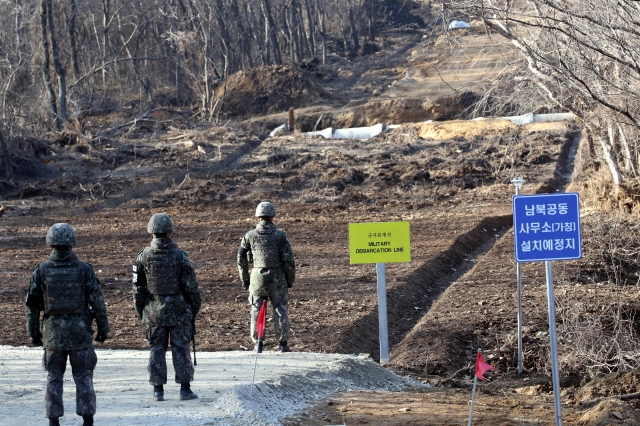 |
|
Road construction in preparation for inter-Korean joint exhumations of Korean War POW/MIA in the DMZ on Nov. 22, 2018. (Kim Bong-gyu, staff photographer)
|
Both sides may hold military talks for implementing agreements
After some of the North Korean staffers who had been withdrawn from the inter-Korean joint liaison office in Kaesong on Mar. 22 returned to their posts following a three-day absence while emphasizing “the implementation of inter-Korean agreements,” the next question is whether North Korea will agree to military talks proposed by the South Korean army and whether a joint project to recover the remains of soldiers who died during the Korean War will take place a week from now as agreed by the two sides. “We’re ready to begin the [joint] recovery [of remains] at any time this week, as soon as we get the green light from the North Koreans. For now, we’re still waiting because we haven’t gotten an answer from North Korea yet,” an official from South Korea’s Ministry of National Defense (MND) said on Mar. 25. Considering that North Korea is exhibiting its commitment to implementing inter-Korean agreements, it’s still possible that military officials from the two sides will meet this week. “We continue to maintain that the joint liaison office needs to facilitate projects in accordance with the goals of the inter-Korean joint declarations,” North Korea’s chief liaison officer at the office told his South Korean counterpart on Monday. MND sources said that South Korean military officials recently approached their North Korean counterparts about holding military talks. The talks would be aimed at discussing the specifics of the joint exhumation of MIA/POW remains, which the two sides agreed to start on Apr. 1 in their Comprehensive Military Agreement (CMA), signed on Sept. 19, 2018, as well as a plan for implementing the military agreement this year. If the military talks are held, the agenda is expected to include an inter-Korean joint military committee for discussing ways to ease military tensions, free travel for civilians in the DMZ’s Joint Security Area (JSA) and security measures to enable the joint usage of the Han River estuary. An MND official explained that there are two possible plans: one would be holding military talks at Panmunjom and then launching the exhumation project afterward, while the other is to start the project on Apr. 1 as agreed and holding the military talks separately. South and North Korea must make a number of practical decisions related to the recovery project, including whether the project will be carried out by mixed teams of South and North Korean workers and in which areas South and North Korea will begin work. Plans for the exhumation project could be discussed through correspondence, or decisions could be made when the command teams from the two sides meet on site on Apr. 1, when the exhumation is slated to begin. But it’s still unclear whether the North Korean military officials will sign on to the South Korean proposal. “I think the North Koreans have a lot to ponder. It still doesn’t look as if North Korea has settled on a definite direction for its strategy. It looks like they need more planning time, which means we’ll probably have to wait,” a source in the military said when asked about the implementation of the military agreement. By Noh Ji-won, staff reporter Please direct comments or questions to [english@hani.co.kr]






